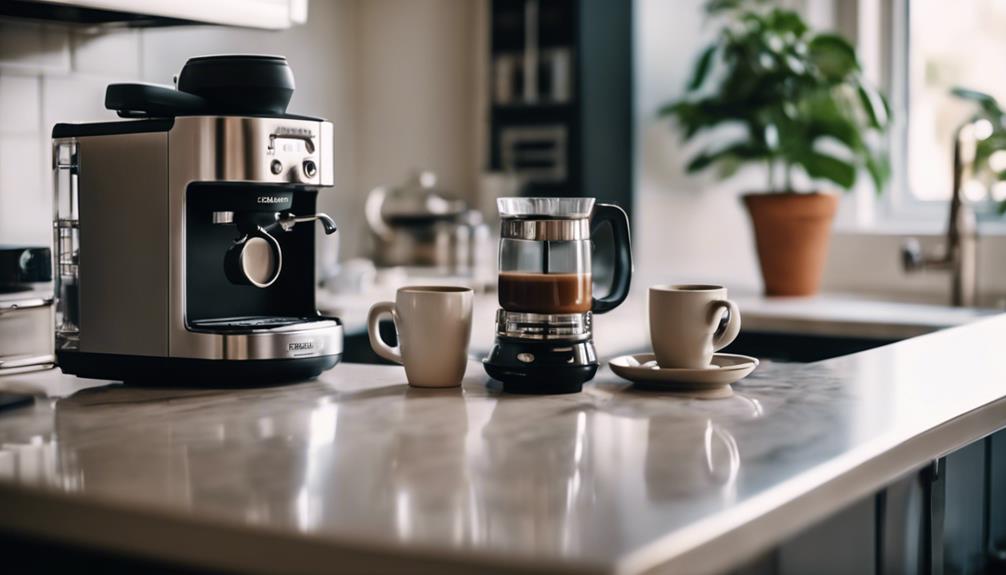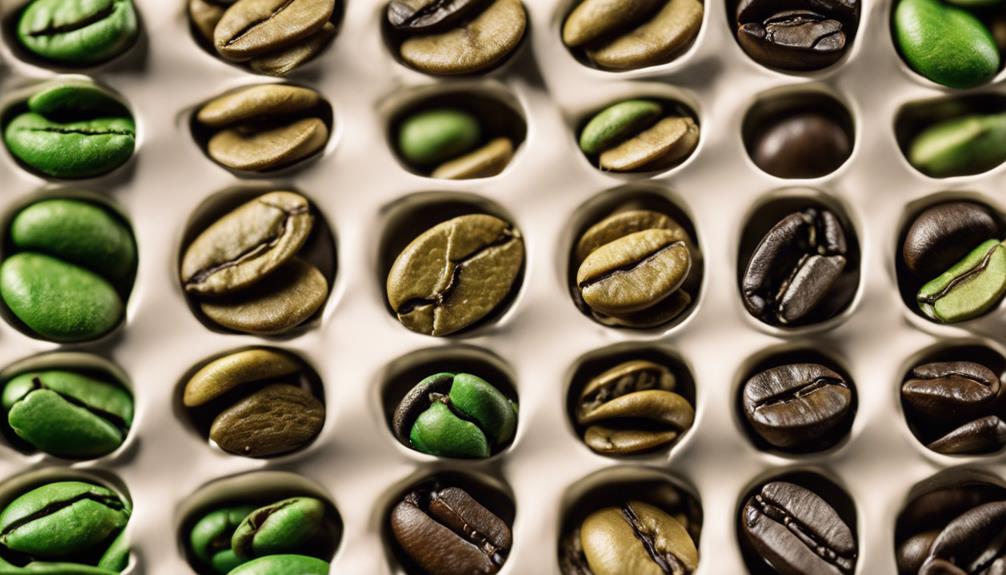Espresso
Espresso Stronger Than Turkish Coffee
On a quest for the ultimate coffee experience? Find out why espresso packs a more intense punch than Turkish coffee in this comparison.

Espresso is stronger than Turkish coffee. The high-pressure extraction in espresso brewing creates a bold and intense flavor. Turkish coffee, on the other hand, offers a smoother taste with intentionally left grounds in the cup. Espresso uses a dark roast, while Turkish coffee typically uses a medium roast. The grind size for Turkish coffee is extremely fine, finer than espresso. A shot of espresso packs around 63 milligrams of caffeine, slightly more than Turkish coffee. If you're curious to learn more about the differences between these two robust coffee experiences, keep exploring the details provided.
Key Takeaways
- Espresso has a higher caffeine content than Turkish coffee.
- Espresso is known for its intense and bold flavor.
- Turkish coffee offers a smoother taste compared to espresso.
- Espresso is brewed under high pressure, enhancing its strength.
- Turkish coffee is renowned for its rich aroma and bold flavor.
Espresso Preparation Method
To prepare espresso, hot water is forced through finely-ground coffee at high pressure, resulting in a concentrated and intense flavor. Espresso machines are specially designed to execute this brewing process efficiently.
The high pressure at which the water is pushed through the coffee grounds is what distinguishes espresso from other brewing methods like Turkish coffee. This quick brewing method allows for the extraction of a rich and bold flavor profile that's beloved by many coffee enthusiasts.
The concentrated flavor of espresso is a direct result of the intense pressure applied during brewing. Unlike Turkish coffee, which involves a slower brewing process, espresso is known for its rapid extraction of flavors.
The fine grind of the coffee beans used in espresso preparation is essential to guarantee optimal extraction under the high pressure conditions. This unique preparation method not only sets espresso apart when it comes to taste but also contributes to its reputation for being stronger than Turkish coffee.
Turkish Coffee Brewing Technique

Brewing Turkish coffee involves combining finely ground coffee beans, water, and sugar in a cezve pot.
The mixture is slowly heated until it froths, producing a rich and flavorful coffee with a unique texture.
This traditional brewing process typically takes around 5-10 minutes to complete.
Brewing Turkish Coffee
When preparing Turkish coffee, combine finely ground coffee, cold water, and sugar in a cezve pot. This traditional method of brewing Turkish coffee requires patience and attention to detail to achieve its rich and bold flavor.
As you slowly heat the mixture in the cezve pot, make sure to stir it continuously. The grounds are intentionally left in the cup after brewing, adding to the unique taste and texture of Turkish coffee.
It typically takes around 5-10 minutes to brew Turkish coffee to the desired strength and consistency. The emphasis on the traditional brewing method highlights the importance of taking the time to savor each step for a truly satisfying coffee experience.
Traditional Coffee Preparation
When preparing Turkish coffee, the traditional brewing technique involves combining finely ground coffee, cold water, and sugar in a cezve pot. This method has been passed down through generations and is an important part of the cultural heritage of many regions.
The fine grind of the coffee beans is essential for achieving the strong flavor that Turkish coffee is renowned for. As the mixture is heated in the cezve pot, it slowly brews to perfection, developing a thick foam on top that adds to its unique character. The intense flavors of Turkish coffee are a result of this meticulous brewing process.
Once the coffee has foamed, it's essential to allow it to cool slightly before serving in a traditional Turkish coffee cup. This slow and deliberate preparation enhances the robustness of the flavor profile, making each cup a rich and aromatic experience that coffee enthusiasts appreciate.
Coffee Bean Roast Levels

When evaluating coffee bean roast levels, it's imperative to understand the impact on flavor profiles and intensity.
The roasting process plays a significant role in determining the strength and aroma of your coffee. Different roasting techniques cater to the unique characteristics of Espresso and Turkish coffee, influencing their final taste experience.
Roast Intensity Levels
Roast intensity levels greatly influence the flavor profiles of both Espresso and Turkish coffee. Espresso requires a dark roast to bring out its intense taste fully. On the contrary, Turkish coffee needs a medium roast as it's brewed with hot water, necessitating a different approach to roasting.
The roasting intensity directly impacts the taste and aroma of the coffee, with darker roasts offering a bolder flavor profile compared to medium roasts. Specific roasting techniques are tailored for each type of coffee to enhance their distinct characteristics.
The choice of roast level for Espresso and Turkish coffee plays an essential role in determining the final taste and strength of the brew. Understanding the differences between dark roast for Espresso and medium roast for Turkish coffee is vital in crafting the perfect cup of either variety.
Flavor Profile Differences
The distinct flavor profiles of Espresso and Turkish coffee are directly influenced by the roast levels of the coffee beans used. Espresso, known for its intense and concentrated flavors, typically requires a dark roast to extract its full taste profile. On the other hand, Turkish coffee, with its rich and robust taste, is best brewed with medium-roasted beans to complement its brewing method. The roasting level plays a significant role in determining the strength and intensity of the coffee, with Espresso aiming for a bolder flavor compared to Turkish coffee.
| Espresso | Turkish Coffee |
|---|---|
| Dark roast | Medium roast |
| Intense flavor | Rich and aromatic |
| Concentrated flavors | Robust taste |
Grind Size Variation

Adjusting the grind size is an essential step in optimizing the flavor extraction for both Turkish coffee and Espresso. When it comes to these two brewing methods, the grind size variation has a substantial impact on the taste and strength of your brew. Here's how grind size plays a pivotal role in enhancing your coffee experience:
- Turkish Coffee: To achieve the perfect cup of Turkish coffee, you need an extremely fine grind, almost resembling powdered sugar. This powder-like consistency allows for thorough extraction of flavors, resulting in a rich and intense brew.
- Espresso: Similarly, Espresso also requires a fine grind, although slightly coarser than Turkish coffee. This finer grind size helps resist over-extraction while still extracting enough flavor to produce the strong, bold shot of Espresso that many coffee lovers enjoy.
- Consistency Matters: In both Turkish coffee and Espresso brewing, maintaining a consistent and appropriate grind size is vital for ensuring the desired taste profile. Even a small variation in grind size can have a significant impact on the final flavor of your coffee.
Intensity of Flavor Profiles

For a truly robust coffee experience, understanding the intensity of flavor profiles between Espresso and Turkish coffee is essential.
Espresso is renowned for its strong and bold taste, achieved through a high-pressure brewing process that extracts a robust flavor from fine coffee grounds. The intense flavor profile of Espresso sets it apart from Turkish coffee, which offers a smoother taste in comparison.
The high-pressure extraction method utilized in brewing Espresso contributes greatly to its bold and distinct flavor, making it a preferred choice for those craving a powerful coffee experience. Turkish coffee, while rich and flavorful, tends to provide a more mellow taste profile when contrasted with the concentrated richness of Espresso.
This difference in flavor intensity between Espresso and Turkish coffee highlights the diverse preferences that coffee enthusiasts may have when seeking out a specific taste profile in their daily brew.
Caffeine Content Variation

Understanding the caffeine disparities between Espresso and Turkish coffee is essential in appreciating their contrasting strengths. When it comes to caffeine content, Espresso typically contains around 63 milligrams per shot, while Turkish coffee ranges from 50 to 65 milligrams per serving.
Here are some key points to take into account:
- Brewing Method: Espresso requires a high-pressure extraction process, resulting in a more concentrated caffeine content per shot compared to Turkish coffee.
- Variability: The caffeine content in Turkish coffee can vary based on factors such as grind size, brewing time, and water temperature, leading to fluctuations in its overall strength.
- Overall Strength: Even though Turkish coffee boasts a bold flavor profile, a shot of Espresso generally packs a stronger caffeine punch per serving due to its intense brewing method.
Considering these aspects can help you choose the coffee that best fits your caffeine needs and preferences.
Preference for Strength & Taste

When choosing between Espresso and Turkish coffee, your preference for strength and taste plays a significant role in determining which brew suits your palate best. Espresso is known for its concentrated flavor and higher caffeine content per shot, offering an intense and robust coffee experience.
On the other hand, Turkish coffee provides a bold taste with a rich aroma, appealing to those who enjoy a different kind of intensity in their coffee. The brewing method also differs between the two, with Espresso being prepared under high pressure for quick extraction, contributing to its perceived strength compared to Turkish coffee.
Individual preferences for intensity and flavor profiles vary, leading to a divide in the choice between Espresso and Turkish coffee. Whether you lean towards the concentrated kick of Espresso or the bold richness of Turkish coffee, your taste buds hold the key to which brew will satisfy your coffee cravings.
Comparing Robust Coffee Experiences

Comparing robust coffee experiences between Espresso and Turkish coffee reveals distinct differences in caffeine content, flavor profiles, and brewing methods.
- Caffeine Content: Espresso packs a punch with approximately 63 milligrams per shot, slightly higher than the 50-65 milligrams found in a serving of Turkish coffee.
- Flavor Profiles: Turkish coffee boasts a bold flavor with a rich aroma, while Espresso is renowned for its concentrated and intense taste.
- Brewing Methods: Espresso is brewed rapidly under high pressure, resulting in a stronger coffee experience compared to the slower brewing process of Turkish coffee. This difference in brewing techniques contributes to the varying levels of strength between these two robust coffee options.
When it comes to choosing between Espresso and Turkish coffee for a truly intense coffee experience, understanding their caffeine content, flavor nuances, and brewing methods can help you select the brew that best suits your robust coffee preferences.
Frequently Asked Questions
Which Coffee Is Stronger Than Espresso?
Espresso is stronger than Turkish coffee due to its higher caffeine content per shot, with approximately 63 milligrams compared to Turkish coffee's 50-65 milligrams per serving.
The quick brewing process of Espresso, involving high-pressure hot water passing through finely-ground beans, creates a concentrated and intense flavor profile.
While Turkish coffee is robust and flavorful, its slower brewing method results in lower caffeine levels per serving, making Espresso the stronger choice for a quick and intense coffee experience.
Is Turkish Coffee Strong Coffee?
Yes, Turkish coffee is indeed considered a strong coffee option due to its intense flavor and concentrated brewing process.
With a rich aroma and robust taste, Turkish coffee typically contains 50-65 milligrams of caffeine per serving.
Its unique brewing method contributes to its reputation as a bold and flavorful choice for coffee enthusiasts looking for a potent caffeine kick.
What Is the Difference Between Turkish Coffee Cup and Espresso Cup?
When comparing Turkish coffee cups to espresso cups, the main difference lies in their size. A Turkish coffee cup typically holds 2-3 ounces, while an espresso cup holds 1-2 ounces.
Despite this disparity, the perceived serving sizes may appear similar due to the unique shapes and designs of each cup. Turkish coffee cups often feature intricate patterns, enhancing the cultural experience, while espresso cups are designed to maintain the crema on top, leading to a smaller size.
Is Espresso Stronger Than Arabic Coffee?
Yes, Espresso is generally stronger than Arabic coffee due to its concentrated brewing method and higher caffeine content.
Espresso's quick extraction process and high-pressure hot water passing through finely-ground coffee beans result in a potent and intense coffee shot.
Arabic coffee, including Turkish coffee, is brewed slowly and has a rich flavor but may have a lower caffeine content compared to Espresso.
Conclusion
When comparing espresso and Turkish coffee, it's clear that espresso takes the lead when it comes to strength. With its intense flavor profile, higher caffeine content, and robust brewing method, espresso offers a bold and invigorating coffee experience.
But don't count out Turkish coffee just yet – its unique brewing technique and rich taste provide a different kind of coffee enjoyment.
In the end, it all comes down to personal preference and the type of coffee experience you're seeking.
Espresso
The Ultimate Guide to Espresso Powder – Enhance Your Baking!
Find out how to unlock the secret to rich, decadent baked goods with the ultimate guide to espresso powder and take your baking to the next level.

You're about to reveal the secret to taking your baking to the next level with espresso powder! Made from darkly roasted coffee beans, this concentrated flavor booster is perfect for enhancing chocolate recipes. Use ¼ to 1 ½ teaspoons to add depth without overpowering your treats. Store-bought or homemade, espresso powder dissolves easily in hot water and lasts up to five months in an airtight container. With its ability to elevate flavor without bitterness, you'll wonder how you ever baked without it. Now, discover how to harness its full potential and transform your baked goods into rich, decadent masterpieces.
Key Takeaways
- Espresso powder is a concentrated flavor booster made from darkly roasted coffee beans, ideal for enhancing chocolate recipes.
- Homemade espresso powder can be made by baking and grinding roasted espresso beans, yielding approximately one cup of powder.
- Espresso powder elevates the flavor of baked goods, particularly chocolate desserts, without adding a strong coffee taste.
- When using espresso powder, dissolve it in hot water before adding to recipes for better flavor distribution and account for additional liquid.
Understanding Espresso Powder
To start working with espresso powder, it's essential that you understand what it's made of and how it can enhance your baked goods, especially those that feature chocolate.
Espresso powder is made from darkly roasted coffee beans that are brewed, dried, and ground into a fine powder. This process creates a concentrated flavor booster that's perfect for baking. When used in moderation, espresso powder can intensify the cocoa flavor in chocolate recipes, such as cakes and brownies, without imparting a strong coffee taste.
When working with espresso powder, it's vital to measure it carefully. The recommended amount ranges from ½ to 1 ½ teaspoons, depending on the recipe. Unlike instant coffee, espresso powder is more concentrated and dissolves easily in hot water, making it ideal for incorporation into batters and frostings.
To maintain its flavor potency, store your espresso powder in an airtight container. With proper storage, homemade espresso powder can last up to five months.
Making Your Own Espresso Powder
Now that you're familiar with the benefits and uses of espresso powder, let's explore how you can make your own at home.
To start, preheat your oven to 200°F and spread roasted espresso beans in a single layer on a baking sheet. Bake them for about an hour, or until they're lightly toasted and dried. Once cooled, grind the beans in a coffee grinder or food processor until they reach a fine powder consistency. This guarantees uniformity and ideal flavor.
You'll be pleased to know that one cup of roasted espresso beans yields approximately one cup of espresso powder, making it a cost-effective option compared to store-bought alternatives.
For the best flavor profile, use organic, medium roast espresso beans. Once you've ground your beans, store the freshly ground espresso powder in an airtight container. This will maintain its freshness and potency for up to 5 months.
With your homemade espresso powder, you can enhance your baked goods with a rich, intense flavor. Simply use it in place of store-bought espresso powder to elevate your recipes. By making your own espresso powder, you'll have complete control over the flavor and quality of your ingredients.
Using Espresso Powder in Baking

When incorporating espresso powder into your baked goods, you'll find that it can markedly enhance the chocolate flavor in treats like cakes, brownies, and cookies without imparting a strong coffee taste, as long as you use it in moderation. To get the most out of your espresso powder, dissolve it in hot water before adding it to your recipe. This guarantees ideal flavor distribution and prevents any bitter notes from forming.
| Espresso Powder Tips | Benefits |
|---|---|
| Use ¼ to 1 ½ teaspoons per recipe | Enhance chocolate flavor without strong coffee taste |
| Dissolve in hot water before adding | Prevents bitter notes and guarantees ideal flavor distribution |
| Account for additional liquid in recipes | Dissolved powder contributes moisture, affecting final texture |
When using espresso powder, you can achieve a depth of flavor similar to brewed espresso without the hassle of brewing. One teaspoon of espresso powder is equivalent to one shot of espresso, making it a convenient addition to your baking routine. Pair it with Dutch process cocoa for an intense chocolate flavor that will elevate your baked goods to the next level.
Benefits and Substitutes Explained
As you explore the benefits of using espresso powder in your baking, it's helpful to understand its role in enhancing flavor and the options available when it's not on hand. Espresso powder is a game-changer for chocolate desserts, intensifying the flavor without leaving a strong coffee taste.
If you're out of espresso powder, don't worry! You can substitute it with dry instant coffee, but keep in mind that you'll need to use 50% more than the recipe calls for.
Here are some key points to reflect on when working with espresso powder:
- Flavor enhancement: Espresso powder elevates the flavor of baked goods, especially chocolate desserts.
- Substitutes: Instant coffee can be used as a substitute, but it may lead to a slightly bitter flavor.
- Homemade option: Making your own espresso powder at home is a cost-effective alternative to store-bought options.
- Omitting espresso powder: If a recipe calls for espresso powder, you can omit it without affecting the texture of the baked goods, but the flavor will be less intense.
Enhancing Recipes With Espresso Powder

By incorporating espresso powder into your recipes, you can reveal a deeper, richer flavor profile in your chocolate desserts. When adding espresso powder to your baked goods, start with small amounts, typically between ½ to 1 ½ teaspoons, to enhance the chocolate flavor without overpowering it. This is especially effective in chocolate cakes, brownies, and cookies, where the powder can transform a basic flavor into a complex and intense taste experience.
To guarantee even distribution, dissolve the espresso powder in hot water before mixing it into batters. If you don't have espresso powder, you can substitute it with instant coffee, using 1.5 times the amount called for in the recipe. However, keep in mind that instant coffee may introduce a slightly different flavor profile.
To maintain the potency and flavor of your espresso powder, store it in an airtight container. This will allow you to enjoy the rich dessert profile it provides for up to five months.
Frequently Asked Questions
Can You Use Espresso Powder for Baking?
You're wondering if you can use espresso powder for baking? Absolutely, you can! Espresso powder is a game-changer in baking, intensifying chocolate flavors without leaving a strong coffee taste, and it's easy to incorporate into your recipes.
What Does Espresso Do in Baking?
When you bake with espresso powder, you'll find that it amplifies the chocolate flavor without leaving a coffee taste, adds richness and complexity to desserts like cakes and cookies, and deepens their flavor profile overall.
Does Espresso Powder Enhance Chocolate Flavor?
Like a master painter adding depth to a canvas, you'll discover that espresso powder is the secret ingredient that elevates your chocolate baked goods, amplifying the richness and complexity of the cocoa flavor, making it truly decadent.
What Is the Benefit of Espresso Powder?
You're about to reveal the secret to intensifying flavors in your baked goods! By incorporating espresso powder, you'll add depth, richness, and a hint of complexity, transforming your desserts and elevating them to the next level.
Conclusion
You've made it to the end of the ultimate guide to espresso powder!
Now, go ahead and elevate your baked goods to the next level.
Did you know that the average American consumes 2.1 cups of coffee per day? That's a lot of buzz!
With espresso powder, you can capture that same energy in your recipes.
Experiment with it, and you'll be hooked.
Your taste buds (and your coffee-loving friends) will thank you.
Happy baking!
Espresso
Breville Espresso Maker – Elevate Your Coffee Game at Home!
Create your perfect cup with the Breville Espresso Maker, a game-changing machine that brings coffee shop-quality drinks to your home.

You're about to take your home coffee game to the next level with the Breville Espresso Maker, a machine that's designed to deliver high-quality, coffee shop-style drinks with ease and convenience. With its quick access to perfect home beverages, you'll be able to brew single and double shots in no time. The machine's super quick technology and internal water tank make it ideal for busy days, and its flexible options cater to your individual preferences and hosting needs. As you explore the Breville Espresso Maker's features, you'll discover just how easy it is to create your perfect cup.
Key Takeaways
- The Breville Espresso Maker allows for quick and easy coffee preparation, ideal for busy days and tailored coffee experiences.
- With three-second activation and internal water tank, brewing is simplified and eliminates the need for external water sources.
- The machine offers precise control over froth levels and temperature settings for customized steaming results and perfect milk textures.
- Cleaning and maintenance are easy with quick clean-up, automatic milk expulsion, and simple surface wipe and rinsing.
Key Features and Benefits
When it comes to the Breville Bambino espresso maker, you'll find a range of key features and benefits that make it an ideal choice for coffee lovers.
Starting with its ability to brew both single and double shots of coffee, whether you're in the mood for a quick single shot or a richer double shot, this machine's got you covered.
This feature allows for great flexibility to tailor your coffee experience according to your daily cravings and moods. It caters perfectly for individuals and when hosting, letting you choose how intense your espresso shot needs to be, on-demand, just when you want.
It takes mere seconds for you to decide you're up for another caffeine dose.
The Breville Bambino ensures you can quickly access a perfect home beverage, making it a great companion for those busy days.
Thanks to its super quick technology features, you can enjoy your coffee without unnecessary delays, allowing you to make the most of your time.
This espresso maker supports your busy lifestyle, making it easier to enjoy quality coffee at home without sacrificing convenience.
Coffee Preparation Made Easy
With its impressive array of key features and benefits, the Breville Bambino espresso maker is designed to make coffee preparation a breeze, allowing you to focus on what really matters – enjoying your perfect cup of coffee.
You'll appreciate the three-second activation time, which enables immediate brewing with just the push of any button. This means you can quickly get started with your coffee preparation, whether you're using freshly ground coffee or pre-ground options.
The double shot cup guarantees a rich and robust flavor in every cup, and the internal water tank simplifies the brewing process by pulling water directly from the tank. This eliminates the need for external water sources, making the process even more streamlined.
You'll also appreciate the flexibility of the Breville Bambino, as it allows you to prepare coffee and milk in any order you prefer. With its user-friendly design, you'll find it easy to operate and maintain the machine, making the shift from coffee preparation to enjoying your beverage seamless.
Whether you're a coffee novice or connoisseur, the Breville Bambino makes it easy to prepare a perfect cup of coffee every time.
Mastering Milk Steaming Techniques

Achieving mastery over milk steaming techniques is a crucial step in elevating your coffee game, and the Breville Bambino is designed to help you get there with precision and ease.
With the Bambino, you can achieve precise control over froth levels, offering low, medium, or high options to tailor your drinks to your preference. This means you can create a perfectly balanced latte or cappuccino with freshly steamed milk every time.
The machine's three temperature settings – low, medium, and high – allow you to customize the steaming process for various beverages, guaranteeing perfect results every time. Utilizing heat sensor technology, the Bambino guarantees ideal foaming and steaming, making it easier to create café-quality drinks at home.
You can achieve a medium froth latte in approximately one minute and three seconds, allowing for quick preparation without sacrificing quality. With the Bambino, you can experiment with different milk types and flavors to create unique and delicious drinks that are freshly made to your liking.
Cleaning and Maintenance Tips
To keep your Breville Bambino in top working order, you'll want to make cleaning and maintenance a regular part of your routine. This guarantees your machine remains in prime condition, allowing you to enjoy perfect coffee at home every time.
Here are some quick cleaning and maintenance tips to keep in mind:
| Task | Description |
|---|---|
| Quick Clean-up | After each use, spend 20 seconds wiping down surfaces and rinsing components. |
| Automatic Milk Expulsion | The Breville Bambino automatically expels excess milk after steaming to prevent damage and maintain cleanliness. |
| Final Cleaning | Simply wipe surfaces and rinse components to keep your machine in top condition. |
Enhancing Your Home Coffee Experience

You're now the barista, bringing the coffee shop experience right into your own kitchen with the Breville Bambino's versatile capabilities.
With this machine, you can create a variety of coffee drinks that cater to your unique tastes. Whether you prefer a strong single shot or a rich double shot, the Breville Bambino has got you covered. You can use freshly ground coffee beans to make each shot, ensuring the best flavor possible.
The machine's quick setup and activation time of just three seconds mean you can enjoy your coffee without waiting around. Plus, with control over milk froth levels and temperature settings, you can customize your beverages to suit your taste.
Want a latte or cappuccino? No problem! The Breville Bambino makes it easy to create these popular coffee drinks at home. By using freshly frothed milk and expertly pulled shots, you'll be able to elevate your home coffee experience to new heights.
With the Breville Bambino, you'll be enjoying coffee shop-quality drinks in the comfort of your own home in no time.
Frequently Asked Questions
How to Make a Latte at Home With Breville Espresso Machine?
You're just a few steps away from a perfect latte! Start by brewing a double shot of espresso, then froth milk to your desired level using the steam wand, and combine for a beautiful layered effect.
Why Is Breville so Expensive?
You're likely wondering why Breville is pricey. It's due to the brand's focus on quality materials, innovative technology, and user-friendly features, which justify the higher cost for a premium coffee experience and long-term durability.
What Is the Best Grind Number for Breville Espresso?
You're seeking the perfect grind, balancing flavor and crema. Typically, a setting between 14 and 18 is ideal. You'll want to experiment, adjusting in small increments, to find your perfect shot, as you refine your espresso game.
Can You Put Ground Coffee in a Breville Espresso Machine Grinder?
You can't put ground coffee directly into the Breville Bambino's components, as it doesn't have a built-in grinder. Instead, you'll need to use a separate grinder to prepare the coffee before loading it into the machine.
Conclusion
You're now the maestro of your own coffee universe, with the Breville espresso maker as your trusted sidekick.
Just as a skilled artist weaves a masterpiece, you'll craft rich, velvety shots that awaken your senses.
As the aromatic espresso flows, imagine the morning sun bursting through your window, bathing your day in warmth and possibility.
Your coffee game has officially been elevated, and every sip is a reflection of your newfound mastery.
Espresso
What Is Espresso? Uncover the Secrets Behind This Bold Brew!
Behind the rich flavors and aromas of espresso lies a world of history, technique, and precision – discover its secrets.

You're about to discover the rich world of espresso, where a perfect blend of coffee beans, precise brewing techniques, and a dash of history come together to create a bold and complex brew. Espresso originated in 19th-century Italy, where innovators like Angelo Moriodo and Luigi Bezzera pioneered steam-driven coffee machines. To craft the perfect shot, you'll need high-quality beans, a balanced roast profile, and a fine grind size. With the right techniques and equipment, you can reveal the secrets of espresso and experience the vibrant flavors and aromas that make it a beloved morning ritual – and that's just the beginning.
Key Takeaways
- Espresso originated in 19th-century Italy, driven by increased coffee demand and the need for faster preparation.
- High-quality coffee beans, freshly roasted, yield rich flavor and aroma, with balanced roast profiles avoiding overly intense light roasts.
- The perfect brewing process involves optimal machine condition, fine grind size, consistent pressure, and peak extraction time of 25-30 seconds.
- Espresso brewing techniques require even tamping, ideal grind size, and proper extraction times for balanced flavor and improved extraction.
Origins of Espresso
When you explore the rich history of espresso, you'll find that it originated in 19th-century Italy as a response to the growing coffee demand and the need for faster coffee preparation in cafes. As coffee became an integral part of Italian culture, the need for a quicker brewing method became apparent.
Angelo Moriodo's invention of the first steam-driven coffee machine in 1884 marked the beginning of espresso's evolution. Luigi Bezzera improved upon Moriodo's design, using steam pressure to brew coffee, which laid the groundwork for modern espresso machines.
The term 'espresso' is derived from the Italian verb 'esprimere,' meaning 'to press out,' reflecting the method of extracting coffee rather than the speed of preparation. You might think that 'espresso' refers to the speed at which coffee is made, but it's actually about the process of forcing pressurized hot water through finely ground coffee.
Understanding the origins of espresso and its early innovators, like Moriodo and Bezzera, helps you appreciate the complexity of brewing coffee and the significance of Italy in shaping the world's coffee culture.
Delving into espresso's history can also help you refine your coffee palate and appreciation for the perfect cup.
The Perfect Brewing Process
To master the art of brewing espresso, you'll need to focus on several key elements that work together to create the perfect shot.
First, verify your espresso machine is in top condition, as it's the foundation of the brewing process.
Next, pay attention to the grind size of your coffee beans – a fine grind, similar to table salt, is ideal for even extraction and peak flavor.
When loading the portafilter, use 18-20 grams of coffee grounds for a single shot, which will result in a rich and concentrated brew.
Tamp the grounds with consistent pressure to promote balanced extraction and flavor.
Now, it's time to brew. The peak extraction time is between 25-30 seconds – too fast and the flavors will be weak, too slow and the shot will be bitter.
As you perfect the brewing process, you'll reveal the rich flavors that espresso has to offer.
With practice, you'll be able to coax out the unique characteristics of each coffee bean, creating a truly exceptional shot.
Ideal Coffee Bean Selection

Selecting the right coffee beans is crucial for crafting exceptional espresso, and you'll want to focus on high-quality, freshly roasted beans that offer unique flavor profiles. When choosing beans, consider the roast profile and flavor profile you prefer. Here's a breakdown of key considerations:
| Bean Characteristics | Impact on Espresso |
|---|---|
| High-quality beans | Rich, vibrant flavor and aroma |
| Freshly roasted beans | Ideal flavor and aroma, with notes of fruit and chocolate |
| Balanced roast profile | Avoids overly intense light roasts, yielding a smooth, full-bodied espresso |
When selecting beans, you'll want to avoid those that are too light or too dark. Instead, opt for beans with a balanced roast profile that will yield a smooth, full-bodied espresso. High-quality beans are crucial for ideal flavor, and freshly roasted beans will guarantee the best possible taste. By choosing the right beans, you'll be well on your way to crafting exceptional espresso. Remember, the quality of the beans greatly influences espresso craftsmanship, so don't be afraid to experiment with different roast profiles and flavor profiles to find your perfect cup.
Espresso Roast Profile Explained
Now that you've selected the perfect coffee beans, it's time to explore the art of espresso roast profiles.
You'll want to understand the characteristics of espresso roasts, which are typically darker and roasted longer to bring out rich and bold flavors.
Espresso Roast Characteristics
When it comes to crafting the perfect espresso shot, understanding the nuances of espresso roast characteristics is key, as the roast profile plays a significant role in bringing out the desired flavors and aromas in your cup.
As you experiment with different espresso roast profiles, you'll discover that they often showcase a deeper, more caramelized flavor profile, thanks to the extended roasting time. However, keep in mind that achieving the perfect balance requires selecting the right type of coffee beans and fine-tuning your roast levels.
It's widely recognized that certain espresso beans – like lighter roasts – can yield overly intense flavors when brewed as espresso, resulting in a cup that's unbalanced and possibly bitter. Conversely, combining different coffee bean origins in the perfect proportion creates the magic blend you want.
That balance directly hinges on both beans you have to craft to effectively keep pace or resonate sound frequency. Yet, combining sound process procedures and putting the correct quantity can yield outstanding pure notes. This set blending produces the peak experience in your espresso.
Flavor Profile Balance
You're likely familiar with the concept that achieving a perfect balance in flavor profiles is vital for a great espresso experience, as it hinges on the delicate interplay between sweetness, acidity, and bitterness.
When it comes to espresso roast profiles, finding this balance is vital. Lighter roasts can be too intense if not roasted carefully, while darker roasts may become bitter if over-roasted. Adjusting roasting times and temperatures helps achieve the desired flavor balance, allowing for variations that cater to personal taste preferences.
To create a balanced espresso, roasters often blend different coffee grounds, including robusta beans, to enhance the caffeine content and introduce a fuller body. The ideal espresso roast profile should result in a harmonious combination of sweetness, acidity, and bitterness.
The presence of crema is a key indicator of the espresso's quality and flavor balance. By understanding how to balance flavor profiles, you'll be able to appreciate the nuances of different espresso roast profiles and find the perfect blend to suit your taste.
Whether you prefer a brighter, more acidic flavor or a richer, more robust taste, achieving flavor balance is vital for a great espresso experience.
Brewing Techniques and Tips

As you explore the world of espresso brewing, you'll quickly realize that perfecting the grind size is essential for achieving that perfect shot.
Mastering the grind size requires attention to detail and a bit of experimentation to find the ideal consistency.
Perfecting the Grind Size
To perfect the grind size for espresso, it's crucial to aim for a fine grind, similar to table salt, which is necessary for ideal extraction and rich flavor.
As you work to master the grind size, consider these key factors to optimize your brewing experience:
- Uniformity is key, and a burr grinder can help achieve the consistency needed for even extraction.
- A fine grind can enhance extraction but can also lead to bitterness if over-extracted.
- For a single shot of espresso, the ideal dose is between 18-20 grams of ground coffee, making precise measurements in grinding essential.
- Experimenting with different grind sizes affects the flavor profile; adjusting this is part of fine-tuning the espresso shot.
Keep these aspects in mind, and remember, fine-tuning your grind size with each use can guarantee your ground coffee complements your burr grinder for an unparalleled shot of espresso every time.
With consistent experimentation, you can enjoy that bold flavor everyone wants to know more about – every shot will deliver perfect and engaging outcomes in mastering that strong blend in brew form!
Mastering Brewing Techniques
Mastering brewing techniques is crucial for releasing the full flavor potential of your espresso, and it starts with understanding the importance of even tamping and precise water temperature control. When you tamp the coffee grounds evenly, you guarantee a balanced flavor profile and improved extraction quality. Additionally, monitoring the water temperature between 195-205°F during brewing is imperative, as this range greatly impacts the final taste of the espresso.
To achieve the perfect coffee, consider the following brewing techniques:
| Brewing Method | Water Temperature | Coffee-to-Water Ratio |
|---|---|---|
| Espresso | 195-205°F | 1:2 |
| Pour-over | 200-210°F | 1:15 |
| French press | 195-205°F | 1:12 |
When brewing espresso, use 18-20 grams of coffee grounds in the portafilter and aim for an extraction time of 25-30 seconds. This will prevent weak flavors from fast extractions or bitterness from slow extractions. By mastering these brewing techniques, you'll be able to bring out the unique flavors of your favorite beans and enjoy a perfect cup of coffee every time. With practice and patience, you'll become a skilled barista, capable of crafting exceptional espresso shots that impress even the most discerning coffee connoisseurs.
Fun Facts and Trivia
Discovering the lesser-known facts behind your favorite morning shot of espresso reveals a complex beverage that's full of surprising details, ranging from its etymology to brewing methods and misconceptions surrounding it.
As you sip on your espresso, you might be wondering what makes it so unique. Let's explore some fun facts and trivia that'll make you appreciate your daily cup even more.
Here are a few interesting tidbits about espresso:
- Espresso doesn't actually mean 'express' in Italian, but rather 'to press out' from the verb 'esprimere'.
- You might think espresso has more caffeine than filter coffee, but a standard serving of espresso actually contains less caffeine overall.
- Italian regulations require specific criteria for a shot of espresso to be considered true espresso, including minimum brewing pressure and extraction time.
- Historically, espresso blends often included robusta beans to increase caffeine content and enhance crema.
These facts show that there's more to espresso than just its bold flavors and rich aromas.
Whether you're a coffee connoisseur or just a casual fan, understanding the intricacies of espresso can enhance your appreciation for this beloved beverage.
Frequently Asked Questions
What Scientists Claim to Have Discovered the Secret to Perfect Espresso?
You're about to uncover the secret to perfect espresso! Scientists claim to have discovered that adding water before grinding coffee beans enhances consistency and taste, reducing static electricity and waste, and leading to stronger flavor extraction.
What Is Bold Espresso?
"Variety is the spice of life," and when it comes to bold espresso, you're in for a treat. You're brewing a concentrated coffee by forcing hot water through finely ground beans, resulting in a rich, strong flavor.
How Is Espresso Different From Coffee?
You're probably wondering how espresso differs from regular coffee. The main differences lie in brewing pressure, grind size, extraction time, and serving size, resulting in a richer, more intense flavor and a unique crema layer in espresso.
What Is the Difference Between Bold and Strong Coffee?
You might've noticed how some friends order "bold" coffee, while others ask for "strong" coffee. What's the difference? Think of it like music – bold coffee is like a rich, complex symphony, while strong coffee is more like a loud, intense beat.
Conclusion
As you wrap up your espresso journey, it's no coincidence that you've discovered the perfect blend of art and science.
The rich flavors and bold aromas have likely left you wondering how something so small can pack such a punch.
It's a coincidence that the same passion and dedication that goes into crafting each shot is the same passion that drives you to savor every last drop.
-

 Coffee Guides2 weeks ago
Coffee Guides2 weeks agoBrew Perfect Coffee at Home: Expert Tips & Tricks
-

 Coffee Guides2 weeks ago
Coffee Guides2 weeks agoBoost Your Coffee: Easy Ways to Enhance Your Brew
-

 Health and Wellness2 weeks ago
Health and Wellness2 weeks agoHeadache-Free: How to Avoid Coffee Headaches!
-

 Vetted2 weeks ago
Vetted2 weeks ago15 Best Trundle Beds for Maximizing Space and Style in Your Home
-

 Coffee Guides2 weeks ago
Coffee Guides2 weeks agoBecome a Coffee Master: Expert Brewing Tips
-

 Coffee Guides2 weeks ago
Coffee Guides2 weeks agoBreve Coffee Explained: Your Cozy Café Favorite
-

 Coffee Guides2 weeks ago
Coffee Guides2 weeks agoHow to Be a Coffee Cup: Embrace Your Inner Brew
-

 Vetted2 weeks ago
Vetted2 weeks ago15 Best Rose Fertilizers to Keep Your Garden Blooming All Season Long
















